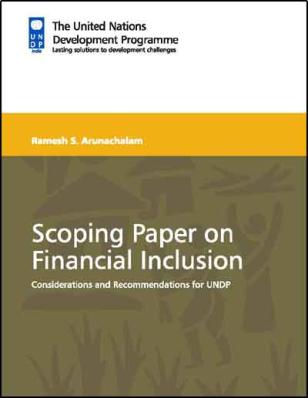Scoping Paper on Financial Inclusion

Scoping Paper on Financial Inclusion
February 20, 2013
To improve livelihoods, generate employment and alleviate poverty, a new paradigm of financial inclusion which goes beyond access to financial services is required.
UNDP’s country programme (2008-12) is positioned within the over-arching objective of the India-United Nations Development Assistance Framework (UNDAF): “Promoting social, economic and political inclusion for the most disadvantaged, especially women and girls”. This is endorsed by the Government of India and harmonized with the country’s the 11th Five Year Plan. The programme is concentrated in seven states – Bihar, Chhattisgarh, Jharkhand, Madhya Pradesh, Orissa, Rajasthan and Uttar Pradesh.
Within the poverty reduction thematic area, UNDP is working with state governments to facilitate the design and implementation of pro-poor and inclusive livelihood promotion strategies. The focus is on excluded groups such as women, Schedule Castes (SCs), Scheduled Tribes (STs), Minorities, below-the-poverty line and migrant households and involuntarily displaced people. Recognizing that access to financial services is a crucial element of livelihood promotion, financial inclusion is an important component of the programme.
UNDP has commissioned a scoping paper on financial inclusion, to help identify its niche in this area and guide its work. A first draft of the paper was shared with sector experts at a consultation on 19 September 2007, and the approach was fine-tuned based on feedback received. A revised version of the scoping paper is what follows below. The paper first covers the context of the economy and poverty in India, and critical challenges including why these necessitate a new financial inclusion paradigm. It goes on to recommend broad themes and generic areas of work for UNDP. The geographic scope of the paper is limited to the seven UN focus states mentioned above, as areas where UNDP will concentrate its activities.

 Locations
Locations